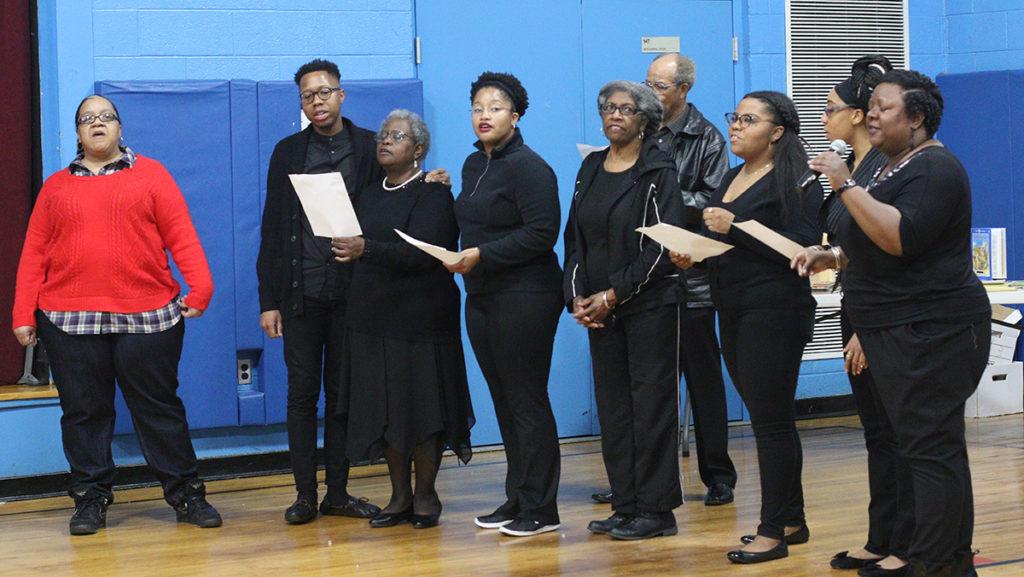The room was silent as the words of a local artist, Sammus, reverberated off the walls of the Greater Ithaca Activities Center. As she rapped about the complexity of blackness, Sammus relayed her experiences growing up as a person of color in the Ithaca community. She spoke about the expectations that are forced on people of color not just by society but also within the black community.
The Black Lives Matter Ithaca held a public event Feb. 25 at the GIAC titled Joy and Pain: Celebrating Black Resistance. It was an opportunity for the black community and its supporters to reflect on the achievements of the Black Lives Matter movement and mourn the lives lost throughout the years in the struggle for equality.
The function featured local speaker Jackie Melton-Scott, a retired educator within the community. Melton-Scott performed a libation, or a religious act of respect, at the gathering in honor of people of color who had lost their lives in the struggle for justice and equality.
Casual and intimate, the gathering encouraged interaction among attendees through an open buffet and family-friendly activities, including book readings, face painting for children, an open mic session and musical performances by some of the chapter’s own members, including Sammus.
The theme of the event was reflected through the open mic session as people of color shared their personal experiences with activism and racism, as well as their hopes for the future. Individuals of other ethnicities and races vocalized their support for the movement as they shared in the process of remembrance and celebrated the recent triumphs of the Black Lives Matter movement.
The movement had notable accomplishments in the last year. Following the police shooting of Baton Rouge resident Alton Sterling in 2016, protesters filed a lawsuit against the city, alleging that police were overly aggressive and used unconstitutional methods. In November 2016, the city settled with the 92 plaintiffs for $100,000. Movement leaders also became recognized by former Secretary of State Hillary Clinton and former President Barack Obama, gained a platform at the 2016 Democratic National Convention and received multiple invitations to the White House to speak with other civil rights activists.
The message of the Black Lives Matter movement was not lost in Ithaca. In November 2015, students of Ithaca College protested against administrative inaction toward racial inequality on campus and subsequently called for the resignation of President Tom Rochon.
Nia Nunn-Makepeace, assistant professor in the Department of Education at the college, said the opportunity to be honest about her experiences as a woman of color is refreshing.
“It’s always, for me, just very exciting and beautiful … when there’s an opportunity to unapologetically acknowledge blackness and to celebrate blackness,” she said. “But to also have a nurturing and authentic space to be raw about some of the common and individual experiences about blackness.”
Among roughly 35 participants, fewer than 10 college students were in attendance. Melton-Scott said the Black Lives Matter movement in Ithaca could be expanded.
“[Black Lives Matter] certainly are becoming more visible to a range of people,” Melton-Scott said. “I would like to see it bigger. I would like to see it more active. I’ve been very active in the movement on Boston as well in Ithaca, and we … need to get some more energy going.”
Lisa Avron, graduate student in the Department of Science and Technology Studies at Cornell University, said it’s crucial that white people, including college students, involve themselves in the Black Lives Matter movement. This is happening through Showing Up for Racial Justice, a national organization whose mission is to act as a part of a multiracial majority for the justice of people of color.
“White people don’t participate in the community of organizing,” Avron said. “They don’t participate in decisions of voting or Black Lives Matter itself, but they do provide support in the form of Showing Up for Racial Justice.”
Nunn-Makepeace said having people to reflect on their relationship with blackness is, in itself, an accomplishment because of historical resistance to the truth.
“Just the sight of ‘Black Lives Matter’ written in places — there’s a moment of recognizing a people’s experience,” Nunn-Makepeace said. “That’s important, and it’s work each and every one of us can do.”
Nevertheless, some seemed to be satisfied with the event, like freshman Margaret McKinnis, who said speaking up for the movement is essential in response to the recent election.
“It’s really empowering to see so many people come out and support Black Lives Matter,” McKinnis said at the event. “It’s [necessary] right now for the voices to be vocal, given the political climate. It’s inspiring. I want to help continue to elevate the voice as well.”














